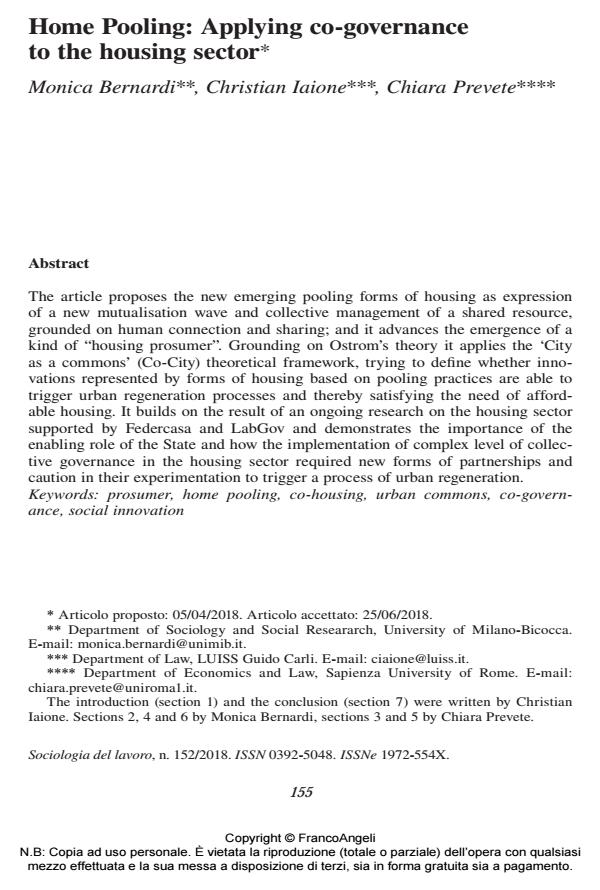Home Pooling: Applying co-governance to the housing sector
Titolo Rivista SOCIOLOGIA DEL LAVORO
Autori/Curatori Monica Bernardi, Christian Iaione, Chiara Prevete
Anno di pubblicazione 2018 Fascicolo 2018/152
Lingua Inglese Numero pagine 19 P. 155-173 Dimensione file 126 KB
DOI 10.3280/SL2018-152009
Il DOI è il codice a barre della proprietà intellettuale: per saperne di più
clicca qui
Qui sotto puoi vedere in anteprima la prima pagina di questo articolo.
Se questo articolo ti interessa, lo puoi acquistare (e scaricare in formato pdf) seguendo le facili indicazioni per acquistare il download credit. Acquista Download Credits per scaricare questo Articolo in formato PDF

FrancoAngeli è membro della Publishers International Linking Association, Inc (PILA), associazione indipendente e non profit per facilitare (attraverso i servizi tecnologici implementati da CrossRef.org) l’accesso degli studiosi ai contenuti digitali nelle pubblicazioni professionali e scientifiche.
The article proposes the new emerging pooling forms of housing as expression of a new mutualisation wave and collective management of a shared resource, grounded on human connection and sharing; and it advances the emergence of a kind of "housing prosume". Grounding on Ostrom’s theory it applies the ‘City as a commons’ (Co-City) theoretical framework, trying to define whether inno¬vations represented by forms of housing based on pooling practices are able to trigger urban regeneration processes and thereby satisfying the need of afford¬able housing. It builds on the result of an ongoing research on the housing sector supported by Federcasa and LabGov and demonstrates the importance of the enabling role of the State and how the implementation of complex level of collec¬tive governance in the housing sector required new forms of partnerships and caution in their experimentation to trigger a process of urban regeneration.
L’articolo interpreta le emergenti formule abitative di stampo cooperativo come espressione di una nuova ondata di mutualizzazione e gestione collettiva di una risorsa condivisa; e apre all’ipotesi che stia emergendo una sorta di "housing prosumer". Muovendo dall’impianto teorico/analitico di Elinor Ostrom applica il quadro teorico della "Città come bene comune" (Co-City) all’analisi del contesto urbano, cercando di definire se le innovazioni introdotte dalle nuove formule abitative basate su pratiche di pooling sono in grado di innescare processi di rigenerazione urbana e quindi soddisfare la necessità di alloggi a prezzi accessibili. Il lavoro costruisce sui risultati di una ricerca in corso sul settore abitativo supportata da Federcasa e LabGov e dimostra l’importanza del ruolo abilitatore dello Stato e di nuove forme di partnership all’interno di complessi modelli di governance collettiva, nonché la necessità di procedere con cautela alla sperimentazione delle nuove formule abitative per innescare un processo di rigenerazione urbana.
Parole chiave:Prosumer, home pooling, co-housing, beni comuni urbani, co-governance, innovazione sociale
- Urban Infrastructure in Zimbabwe Innocent Chirisa, Takawira Mubvami, Brilliant Mavhima, Abraham R. Matamanda, Thembani Moyo, pp.17 (ISBN:978-3-031-45567-4)
Monica Bernardi, Christian Iaione, Chiara Prevete, Home Pooling: Applying co-governance to the housing sector in "SOCIOLOGIA DEL LAVORO " 152/2018, pp 155-173, DOI: 10.3280/SL2018-152009